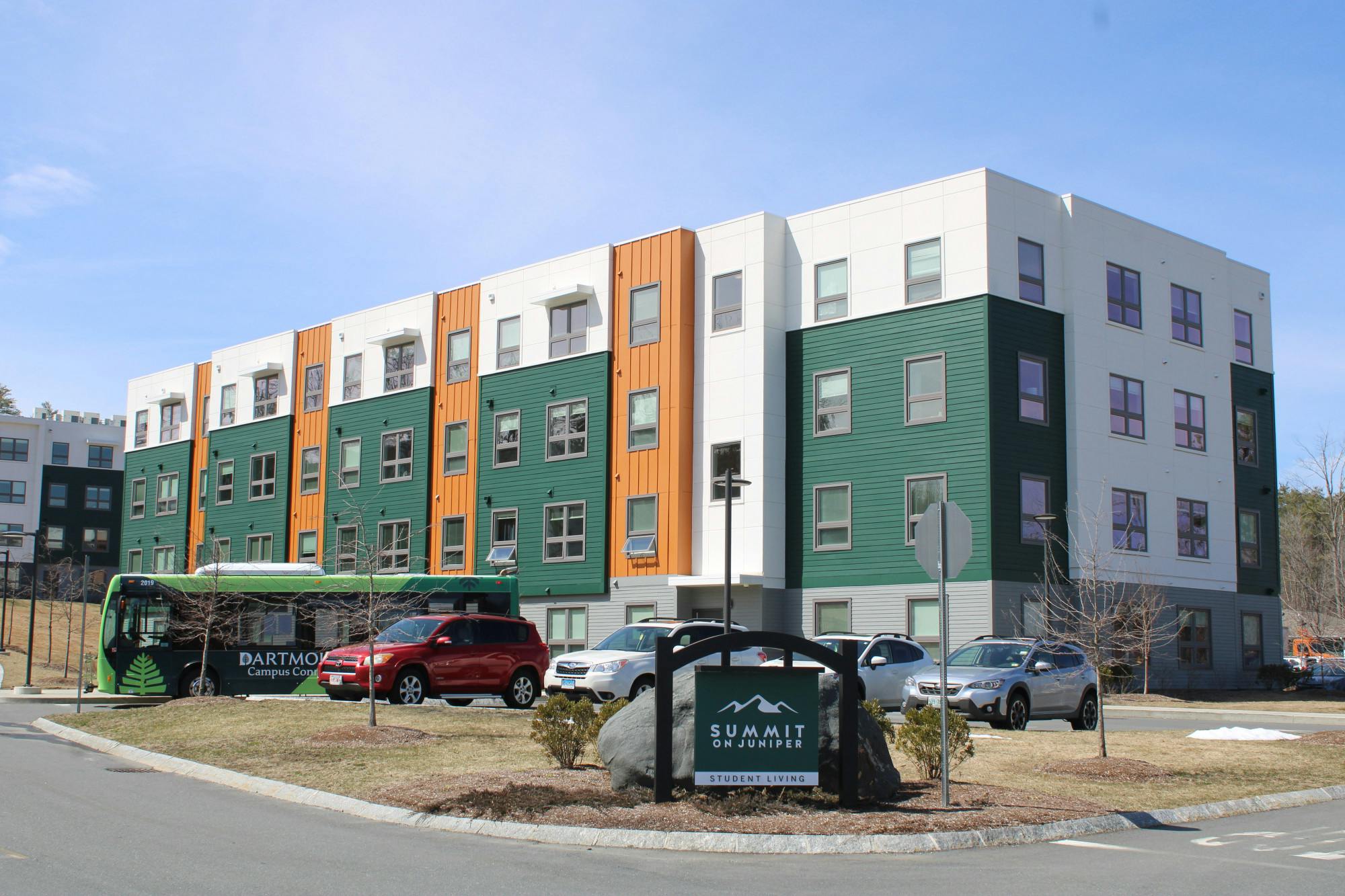Whether it’s escaping the Choates, getting that long-desired single or striving for the comforts of “Hotel” Wheelock, the housing draw brings out students’ hopes for better possibilities. This is especially true for those living at Summit on Juniper, a College-owned apartment complex in West Lebanon.
Summit is undeniably isolated, more than three miles away from the College. To get to campus, Summit residents without a car must take a 22 minute bus ride. Some students like it; others aren’t so sure.
Robert Szostakiewicz ’28, for one, selected Summit as his first choice out of appreciation for the “very fact that it’s remote” and that one is “basically guaranteed a single room.”
“Summit sounds like a really good option for people that value their private space and peace,” Szostakiewicz said. “I hope that it’ll just give me a bit more space and peace in comparison to on campus, where people go partying every other day.”
Summit wasn’t initially housing for undergraduates. It was home to graduate students until the College ran into a shortage of housing on campus and had to start displacing students. The first time undergraduates lived at Summit was the spring of 2022, after the College “estimated that between 100 and 150 students seeking residence [that] spring would be denied on-campus housing” that fall, according to previous reporting by The Dartmouth.
Renovations made the problem worse. In 2024, with the onset of a two-year renovation of the Fayerweather Halls — which formerly housed approximately 200 freshmen every year — the Undergraduate Housing Office started housing more undergraduates at Summit, according to associate director of undergraduate housing Elicia Rowan.
Szostakiewicz acknowledged that people are often “shocked” when he tells them Summit was his first choice.
“What baffles me is that [selecting Summit is] such a contentious choice. I think many people would value … the convenience that Summit might provide,” Szostakiewicz said. “I think they’re just afraid of taking the bus.”
Kaan Doğan ’28, who is from West House, says that he thinks that he will most likely end up at Summit, after not getting a room during room draw. He’s still trying to avoid it, however. Doğan opted not to enroll in the “priority list” for Summit, instead vying to get into a regular dorm or a Living Learning Community — where students attend academic programs with their housemates.
Entertaining the possibility of being exiled to Summit, Doğan said that his “late nights might be cut short” and that he might have to “leave parties and pong games early.”
“It’s nice that we have a guarantee for the sophomores, but I wish we had an on-campus guarantee for sophomores,” Doğan said. “I would like to be able to just go to the Green when [my friends] text me ‘let’s meet up at the Green!’”
Doğan added that he feels he will be “isolated” at Summit.
“I know it might sound dramatic for a 15 minute bus ride, but it’s not the same as just walking out of your dorm,” Doğan said.
Based on the experience of previous Summit residents, Doğan’s fears are not so unfounded. Last year, Marshall Matthews ’27 decided to try Summit after both he and his roommate drew poor “room selection numbers” — which determine how much choice a student has over their housing.
“[The numbers were] very unlucky. And because we were in West House, there were not nearly enough beds for the number of students,” Matthews said. “We watched all of our options vanish more than an hour before we were even given a time slot.”
After going on the waitlist, Matthews and his roommate received a notification that they could either choose to break up their roomate group or live together in Summit.
Weighing the “pros and cons,” the two decided to try Summit: a “naive” choice, Matthews said.
Matthews’s roommate only stayed in Summit for the fall. Matthews tried to “stick it out” for one more term, but decided to move out during winter term, citing the “intolerable” cold. He said he missed the convenience of campus.
“It’s not a nice experience compared to all of your friends who live on campus and can go wherever they want within a five minute walk,” Matthews said. “It feels so bad in comparison that I just decided that I wasn’t able to take … living [at] Summit anymore.”
Matthews said he was “basically alone in this complex on top of a hill” and that Summit was “very far” in a “very unpleasant” way.
“There was not any real sense of community that I felt anyway. People would get off the bus … just walk straight into their building and into their room,” Matthews said. “It just felt like people were just being transported to this place where they sleep.”
Matthews also noted that the campus connector ran “infrequently at night,” which “discouraged” him from nighttime social activities such as club or Greek house meetings.
“It’s really annoying to have the campus connector come and then you have to wait another hour for the next one to arrive. It makes scheduling things impossible,” Matthews said. “I would have to either choose not to show up or ask one of my friends to drive me back to Summit.”
Matthews recommends that anyone who “cares about living close to campus” stay on the housing waitlist.
“Don’t accept the offer from Dartmouth to live in Summit,” Matthews said. “It is very difficult to have a college experience when you live 20 minutes from the College that you’re supposed to be experiencing, rather than living in it.”




